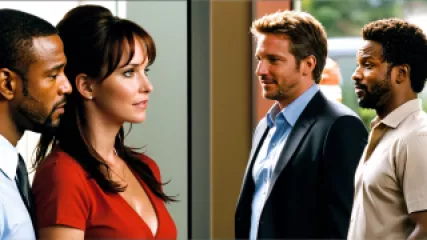Learning from Movie Apologies: A Psychological Analysis
Introduction:
Apologies are a fundamental aspect of human interaction and play a crucial role in maintaining healthy relationships. Whether it is mending a broken friendship or reconciling with a loved one, apologies have the power to heal emotional wounds and restore trust. But what can we learn about apologies from the world of movies? In this article, we will delve into the psychology of apologies by analyzing memorable movie apologies and exploring their implications in real-life situations. By examining the dynamics of these on-screen apologies, we can gain valuable insights into the art of apologizing and its impact on self-improvement and relationships.
The Power of Apologies
Apologies hold significant power in our lives. They allow us to acknowledge our mistakes, take responsibility for our actions, and express remorse. Moreover, apologies provide an opportunity for personal growth and strengthen the bonds between individuals. Research has shown that sincere apologies can lead to forgiveness, improved emotional well-being, and enhanced relationship satisfaction.
However, not all apologies are created equal. The effectiveness of an apology depends on various factors such as sincerity, empathy, and understanding. Movie apologies offer a unique lens through which we can examine different aspects of apologies and uncover valuable lessons.
The Psychology Behind Movie Apologies
Movies often provide us with rich narratives and complex characters, allowing us to witness a wide range of apologies. These on-screen apologies can be analyzed through the lens of psychology to understand the underlying motivations, emotions, and consequences associated with each apology.
One key aspect of movie apologies is the presence of external factors that influence the apology process. For example, societal norms, cultural expectations, and the context of the situation can shape the way apologies are given and received. By examining how these external factors interact with internal psychological processes, we can gain a deeper understanding of the complexities of apologies.
Moreover, movie apologies can shed light on the importance of nonverbal cues in conveying sincerity. Facial expressions, body language, and tone of voice all contribute to the effectiveness of an apology. By examining how these nonverbal cues are portrayed in movies, we can learn how to better convey our feelings of remorse and sincerity in real-life apologies.
Apology Lessons from Movie Characters
Now let's take a closer look at some notable movie apologies and the lessons we can learn from them:
1. "Erin Brockovich" - Erin's Apology to George
In the movie "Erin Brockovich," Erin, played by Julia Roberts, delivers a heartfelt apology to George, a man she initially misjudges. Erin's apology demonstrates the power of self-reflection and personal growth. She acknowledges her mistake, takes responsibility for her misjudgment, and shows genuine remorse. This apology teaches us the importance of humility and the willingness to admit when we are wrong.
2. "Silver Linings Playbook" - Pat's Apology to Tiffany
In "Silver Linings Playbook," Pat, played by Bradley Cooper, apologizes to Tiffany, portrayed by Jennifer Lawrence, after a heated argument. Pat's apology highlights the significance of empathy and understanding. He listens attentively to Tiffany's perspective, validates her feelings, and offers a sincere apology. This apology teaches us the importance of active listening and considering the other person's point of view.
3. "The Pursuit of Happyness" - Chris' Apology to Christopher
In this inspiring film, Chris, played by Will Smith, apologizes to his son Christopher for not being there when he needed him the most. Chris' apology showcases the power of vulnerability and the willingness to repair damaged relationships. He openly acknowledges his shortcomings, expresses deep remorse, and commits to being more present in his son's life. This apology teaches us the importance of accountability and making amends.
Applying Movie Apologies to Real Life
While movie apologies provide valuable insights, it is essential to apply these lessons to our own lives. Here are some practical tips for offering sincere apologies:
- Reflect on your actions: Take time to understand the impact of your behavior and acknowledge your mistakes.
- Take responsibility: Accept accountability for your actions without making excuses or shifting blame.
- Show empathy: Put yourself in the other person's shoes and strive to understand their perspective.
- Express genuine remorse: Communicate your feelings of regret and apologize sincerely.
- Make amends: Take steps to rectify the situation and demonstrate your commitment to change.
- Learn from the experience: Use the apology as an opportunity for personal growth and self-improvement.
Conclusion
Movie apologies offer a unique lens through which we can examine the psychology of apologies. By analyzing memorable movie apologies, we gain valuable insights into the art of apologizing and its impact on self-improvement and relationships. Understanding the complexities of apologies allows us to navigate conflicts with empathy, sincerity, and a commitment to personal growth. So, let's take these lessons from movie apologies and apply them to our own lives, fostering stronger connections and emotional well-being through the power of sincere apologies.






